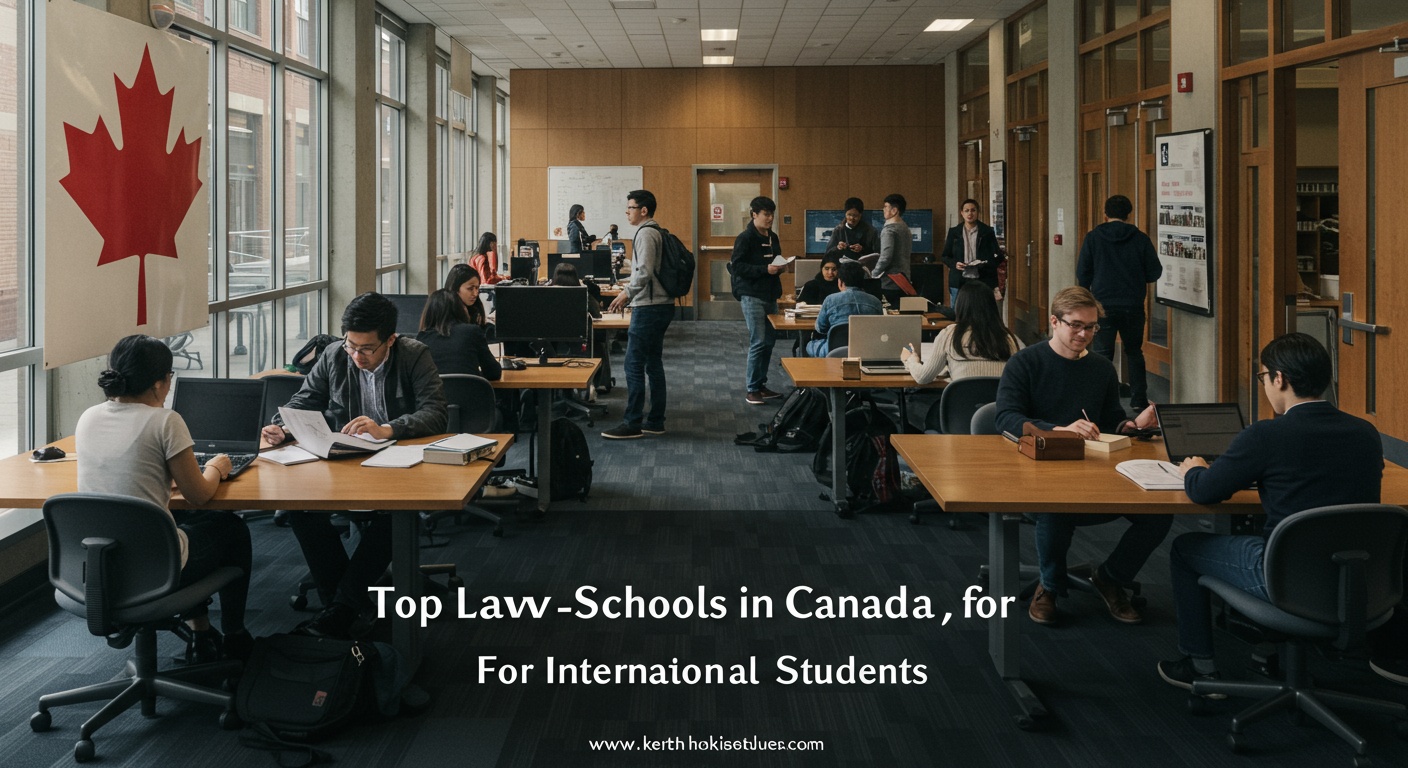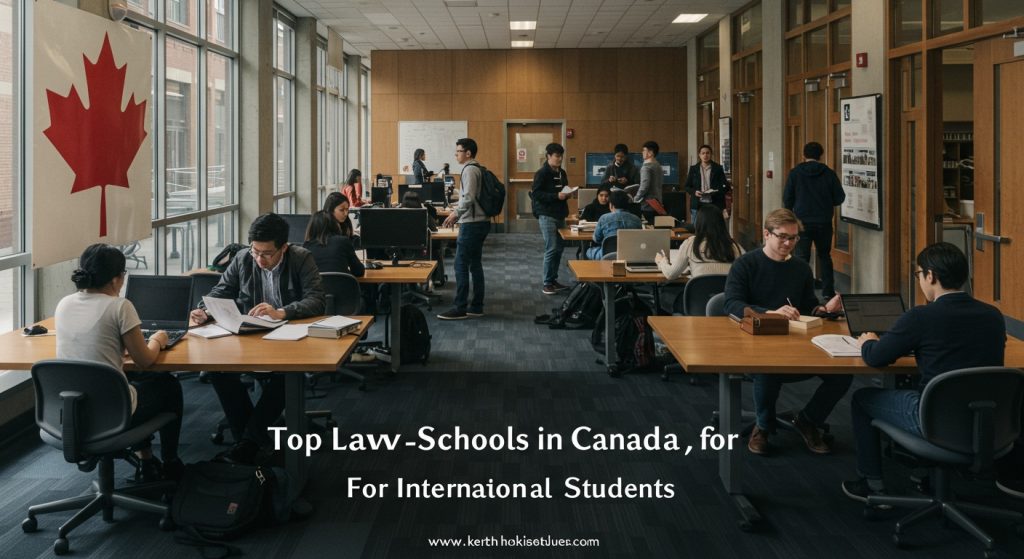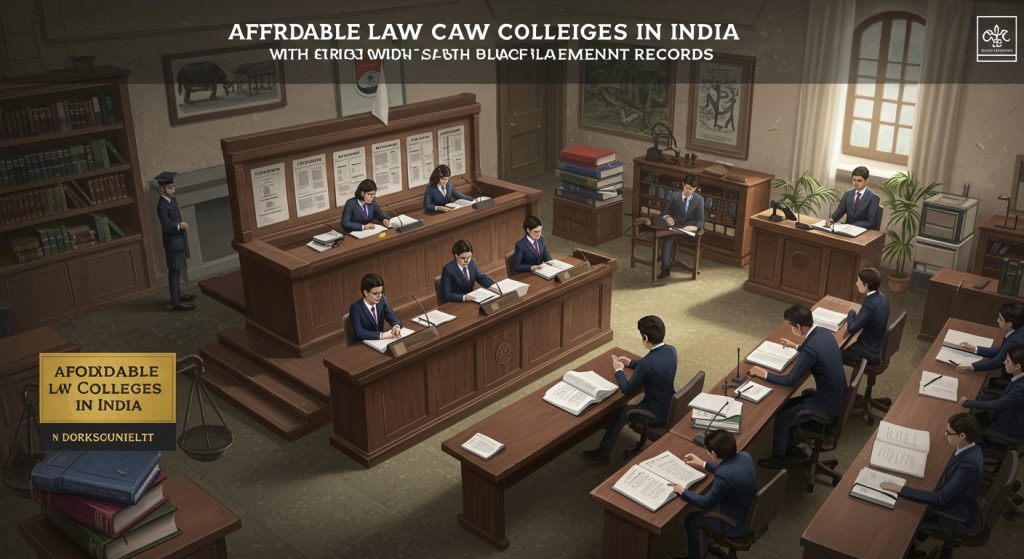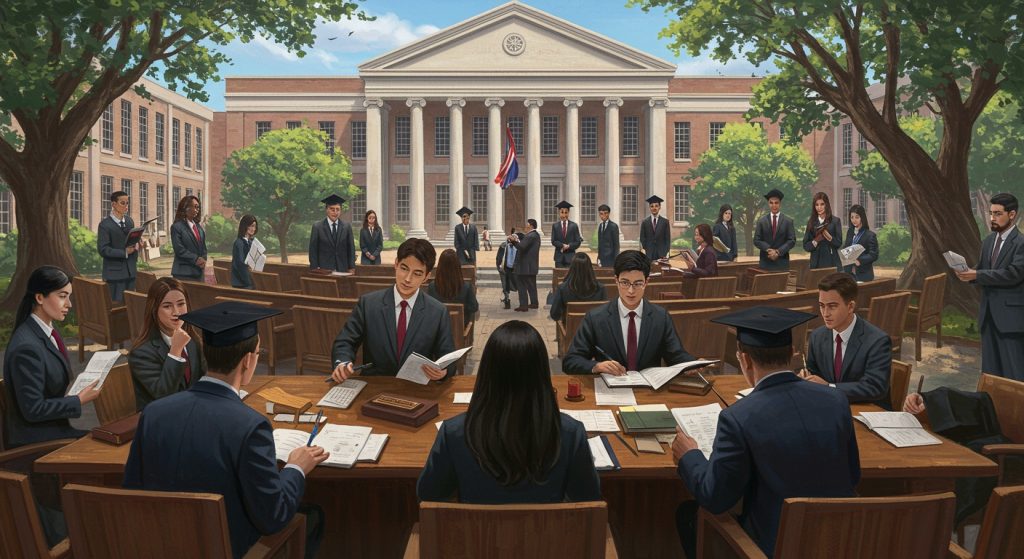Canada’s legal landscape is increasingly attracting global talent, yet navigating its top law school options can be daunting for international students. Understanding that your legal education is more than just a degree, this focuses on transformative opportunities. Consider the University of Toronto’s emphasis on international law or McGill University’s bilingual common law and civil law programs, each offering unique paths. Key factors include specialized programs, such as Osgoode Hall’s focus on social justice. Experiential learning opportunities like clinics and moots. This evaluation will highlight vital aspects from tuition fees to bar admission requirements, crucial for international students aiming to thrive in the Canadian legal profession.

Understanding Canadian Law Degrees: A Primer for International Students
Navigating the world of legal education in a foreign country can be daunting. In Canada, law degrees are primarily offered as Juris Doctor (JD) programs. Unlike some countries, a prior law degree is not a prerequisite for entry into a JD program. Instead, applicants typically need a bachelor’s degree in any field. This makes Canadian law schools accessible to a diverse range of international students with varied academic backgrounds.
The JD program is a rigorous three-year curriculum covering foundational legal principles, critical analysis. Practical skills. The focus is on developing well-rounded lawyers equipped to handle complex legal challenges. Some schools also offer combined programs, such as a JD/MBA, allowing students to pursue interdisciplinary studies.
Key Considerations for International Applicants
Before embarking on your journey to study law in Canada, several factors merit careful consideration:
- Academic Requirements: Each law school sets its own admission standards. But, a strong academic record is crucial. Transcripts from international institutions are typically evaluated by services like World Education Services (WES) to determine equivalency to Canadian standards.
- LSAT (Law School Admission Test): The LSAT is a standardized test that assesses reading comprehension, logical reasoning. Analytical reasoning skills. Most Canadian law schools require applicants to submit LSAT scores. Preparation is key to achieving a competitive score.
- English Language Proficiency: If English is not your first language, you’ll need to demonstrate proficiency through tests like TOEFL or IELTS. Each school has minimum score requirements, so check the specific criteria for your target institutions.
- Financial Resources: Studying in Canada can be expensive. Tuition fees for international students are significantly higher than for domestic students. Factor in living expenses, books. Other costs. Research scholarship opportunities and financial aid programs available to international students.
- Visa Requirements: As an international student, you’ll need a valid study permit to study in Canada. The application process can be lengthy, so start early. Ensure you meet all the eligibility criteria and provide the necessary documentation.
- Career Goals: Consider your long-term career aspirations. Some law schools have strengths in specific areas of law, such as international law, environmental law, or business law. Choose a school that aligns with your interests and career goals.
Top Law Schools in Canada: A Closer Look
While rankings should not be the sole determinant in your decision, they can provide a useful starting point. Here’s a look at some of the top law schools in Canada, highlighting their strengths and unique features:
University of Toronto Faculty of Law
The University of Toronto Faculty of Law is consistently ranked among the top law schools in Canada and globally. It boasts a renowned faculty, a diverse student body. A strong emphasis on research and innovation.
- Strengths: Constitutional Law, Criminal Law, International Law, Legal Theory
- Unique Features: Extensive clinical programs, joint degree programs (e. G. , JD/MBA, JD/MA in Criminology). A global professional program offering international learning experiences.
- International Student Support: The Faculty of Law provides dedicated support services for international students, including visa insights, cultural adjustment assistance. Career counseling.
McGill University Faculty of Law
McGill University’s Faculty of Law is known for its unique integrated civil and common law program. Students learn both legal systems, providing a distinct advantage in a globalized world.
- Strengths: Civil Law, Common Law, Human Rights Law, International Law
- Unique Features: BCL/JD program integrating civil and common law, a strong focus on bilingualism (English and French). Numerous international exchange opportunities.
- International Student Support: McGill offers comprehensive support services for international students, including immigration advising, cultural events. Academic support.
University of British Columbia (UBC) Allard School of Law
The UBC Allard School of Law is located in Vancouver, a vibrant and diverse city. The school has a strong focus on social justice and Indigenous legal issues.
- Strengths: Aboriginal Law, Environmental Law, Business Law, Criminal Law
- Unique Features: Indigenous Legal Studies Program, extensive clinical programs. A focus on experiential learning.
- International Student Support: UBC provides a range of services for international students, including orientation programs, academic advising. Career services.
Osgoode Hall Law School, York University
Osgoode Hall Law School at York University is one of the largest and most diverse law schools in Canada. It offers a wide range of programs and specializations.
- Strengths: Administrative Law, Labour Law, Corporate Law, Criminal Justice
- Unique Features: Professional Development Program, clinical programs. A variety of specialized programs (e. G. , LLM in various areas).
- International Student Support: York University provides dedicated support services for international students, including visa assistance, cultural workshops. Language support.
University of Alberta Faculty of Law
The University of Alberta Faculty of Law offers a strong foundation in legal principles and a focus on practical skills. It’s particularly well-regarded for its natural resources and energy law programs.
- Strengths: Natural Resources Law, Energy Law, Criminal Law, Commercial Law
- Unique Features: Centre for Constitutional Studies, clinical law program. A focus on legal research.
- International Student Support: The University of Alberta offers comprehensive support services for international students, including immigration advising, cultural events. Academic support.
Comparing Law Schools: A Table
| Law School | Location | Key Strengths | Unique Features |
|---|---|---|---|
| University of Toronto | Toronto, Ontario | Constitutional Law, Criminal Law | Global Professional Program, Joint Degree Programs |
| McGill University | Montreal, Quebec | Civil Law, Common Law, Human Rights Law | BCL/JD Integrated Program, Bilingual Focus |
| UBC Allard School of Law | Vancouver, British Columbia | Aboriginal Law, Environmental Law | Indigenous Legal Studies Program, Clinical Programs |
| Osgoode Hall Law School | Toronto, Ontario | Administrative Law, Labour Law | Professional Development Program, Diverse Specializations |
| University of Alberta | Edmonton, Alberta | Natural Resources Law, Energy Law | Centre for Constitutional Studies, Clinical Law Program |
Funding Your Legal Education: Scholarships and Financial Aid
Tuition fees for international students can be substantial. Fortunately, various scholarships and financial aid programs are available to help ease the financial burden.
- Law School Scholarships: Many law schools offer scholarships specifically for international students. These scholarships may be based on academic merit, financial need, or a combination of both. Check the websites of your target schools for eligibility criteria and application deadlines.
- External Scholarships: Explore external scholarship opportunities offered by organizations like the Canadian government, foundations. Private companies. Websites like ScholarshipsCanada. Com can help you find relevant scholarships.
- Student Loans: Some international students may be eligible for student loans from their home countries or from private lenders. Research your options carefully and compare interest rates and repayment terms.
- Bursaries and Grants: Bursaries and grants are typically awarded based on financial need. Check with the financial aid offices at your target schools to see if you qualify.
- Work-Study Programs: Some law schools offer work-study programs that allow students to earn money while studying. These programs can help offset living expenses and gain valuable work experience.
It’s wise to start researching funding options early in the application process. Many scholarships have early deadlines, so don’t delay.
Applying to law school can be a complex process. The challenges are often amplified for international students. Resources like the Top Law Programs in Canada: A Comparative Analysis can provide additional insight.
Navigating the Canadian Legal System as an International Graduate
After graduating from law school, international students who wish to practice law in Canada must meet specific requirements, which vary by province or territory.
- National Committee on Accreditation (NCA): The NCA assesses the credentials of internationally trained lawyers and law graduates to determine if they meet the standards for admission to law societies in Canada. You may be required to complete additional coursework or examinations to demonstrate competency in Canadian law.
- Articling: Most provinces require law graduates to complete a period of articling, which is a supervised apprenticeship with a practicing lawyer. This provides practical experience and prepares graduates for the bar admission process.
- Bar Admission Course and Examination: After completing articling, you’ll need to complete a bar admission course and pass the bar examination in the province or territory where you intend to practice.
- Law Society Membership: Once you’ve met all the requirements, you can apply for membership in the law society of your chosen province or territory. This allows you to practice law in that jurisdiction.
The path to becoming a licensed lawyer in Canada can be challenging. With dedication and perseverance, international graduates can successfully navigate the process and build fulfilling legal careers.
Conclusion
Choosing the right law school in Canada as an international student is more than just picking a name; it’s about aligning your career aspirations with a program that provides the necessary support and opportunities. [Top Law Programs in Canada: A Comparative Analysis](https://biguniversities. In/top-law-programs/) and researching faculty specializations are crucial first steps. As someone who navigated this process myself, I can attest to the importance of understanding the nuances of each school’s approach to international student integration. Don’t underestimate the value of networking events and career services tailored to international graduates; they can significantly impact your job search in Canada. Moving forward, proactively connect with current students and alumni to gain firsthand insights. The Canadian legal landscape is constantly evolving, so continuous learning and adaptation will be key to your success. Embrace the challenges, stay informed. Remember that your unique international perspective is a valuable asset in the legal profession.
FAQs
Okay, so what are generally considered the top law schools in Canada for international students?
Alright, so you’re looking for the best of the best. Generally, you’ll find schools like the University of Toronto, McGill University, Osgoode Hall Law School (York University). The University of British Columbia consistently ranked highly. These schools have strong reputations, excellent faculty. Good resources for international students.
What makes a law school ‘good’ for international students specifically? Is it just ranking?
It’s more than just rankings! While rankings are a factor, consider things like specific programs that align with your interests, the school’s support system for international students (immigration advising, cultural events, etc.). Opportunities for international internships or exchanges. Also, think about location – do you want to be in a big city or a smaller town?
What kind of academic background do I need to even think about getting into these schools?
You’ll need a strong undergraduate degree. The specific field doesn’t always matter – law schools want to see that you can think critically, write well. Assess data. A good GPA is essential. Many schools require the LSAT (Law School Admission Test). Check the specific requirements for each school; they can vary!
The LSAT? Ugh. Is it weighted heavily?
The LSAT is definitely a significant factor in your application. It’s designed to assess your reading comprehension, logical reasoning. Analytical reasoning skills. How heavily it’s weighted varies by school. A strong LSAT score can really boost your chances, especially if other parts of your application are less competitive.
How expensive are we talking, tuition-wise, for international students?
Brace yourself! Tuition for international students is considerably higher than for domestic students. It can range anywhere from $30,000 to $60,000 CAD per year, depending on the school and program. And that’s just tuition – don’t forget living expenses, books. Other fees.
Are there any scholarships or financial aid options available for international law students?
Yes. They can be quite competitive. Many law schools offer scholarships specifically for international students. There are also external scholarships you can apply for. Start researching early and be prepared to put in the effort to write strong applications. Also, explore loan options in your home country, as Canadian student loans are generally not available to international students.
What about after graduation? Can I actually practice law in Canada as an international student?
It’s possible. It’s a process. You’ll need to complete the requirements set by the law society in the province where you want to practice. This usually involves articling (a period of practical training under the supervision of a lawyer) and passing the bar exams. Some provinces also require internationally trained lawyers to complete additional coursework or assessments.



